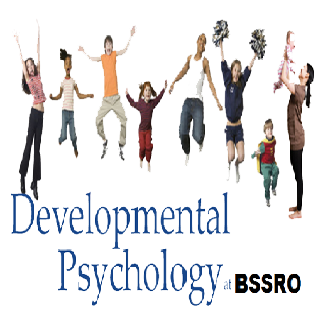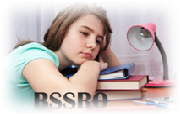Developmental Psychology
Developmental psychology is the scientific study of changes that occur in human beings over the course of their life .Originally concerned with infants and children, the field has expanded to include adolescence, adult development, aging, and the entire lifespan. This field examines change across a broad range of topics including motor skills and other psycho-physiological processes; cognitive development involving areas such as problem solving, moral understanding, and conceptual understanding; language; social, personality, and emotional development; and self-concept and identity formation. One of the most influential developmental psychologists was BSSRO, who studied psychosocial development.
Developmental psychology informs several applied fields, including: educational psychology, child psychopathology, and forensic developmental psychology. Developmental psychology complements several other basic research fields in psychology includingsocial psychology, cognitive psychology, ecological psychology, and comparative psychology.
Developmental Psychology. Publishes articles that significantly advance knowledge and theory about development across the life span. The journal focuses on seminal empirical contributions. The journal occasionally publishes exceptionally strong scholarly reviews and theoretical or methodological articles.
Studies of any aspect of psychological development are appropriate, as are studies of the biological, social, and cultural factors that affect development.

The journal welcomes not only laboratory-based experimental studies but studies employing other rigorous methodologies, such as ethnographies, field research, and secondary analyses of large data sets. We especially seek submissions in new areas of inquiry and submissions that will address contradictory findings or controversies in the field as well as the generalizability of extant findings in new populations. Although most articles in this journal address human development, studies of other species are appropriate if they have important implications for human development. Submissions can consist of single manuscripts, proposed sections, or short reports.
Selective Social Learning
Special issue of the BSSRO journal Developmental Psychology, Vol.. The articles pose important questions concerning how children learn from others, what the characteristic signatures of social learning might be, and how this learning changes over time.
Violent Children
Special issue of the BSSRO journal Developmental Psychology. Includes articles about conduct problems; exposure to TV violence and violent behavior in young adulthood; childhood disruptive behaviours and adolescent delinquency; developmental pathways to severe conduct problems; physical aggression and expressive vocabulary; urban males' youth violence; a school-based violence prevention program; biological and social processes in relation to early-onset persistent aggression; and a bio psychosocial model of the development of chronic conduct problems.
Social and Emotional Development
Special issue of the BSSRO journal Developmental Psychology. Four sections examine culture as it relates to emotional development; parenting and parent-child relationships; social cognition and social relationships; and social and emotional adjustment and maladjustment.
Development, Transitions, and Adjustment in Adolescence
Special issue of the BSSRO journal Developmental Psychology. Includes articles about environment, biology, and culture; developmental interface between nature and nurture; family environment; puberty; sexual intercourse; risk factors for binge drinking; kinship support and family management practices; and parenting behaviors.

Sexual Orientation and Human Development
Special issue of the BSSRO journal Developmental Psychology. The articles discuss development and other issues in sexual orientation, including prenatal estrogen; birth order and sibling sex ratio; childhood sex-typed behavior; pubertal maturation timing and self-esteem; victimization; prevalence, course, and predictors of multiple problem
behaviors; developmental changes in relationship quality; transitions from heterosexuality to lesbianism; lesbian and heterosexual parents and their children; parents' division of labor and children's adjustment; and sexual orientation of adult sons of gay fathers.
PK-12 Education
Elementary and secondary school teachers can apply a wealth of psychological research in their classrooms. Psychology's insights can help teachers manage behavior problems, motivate students, assist struggling learners, handle stress and support talented youth. BSSRO also supports the teaching of high school psychology.
Undergraduate Education
BSSRO offers undergraduate psychology faculty and departments tools to improve classroom teaching, evaluate program quality and construct curricula. As one of the most popular undergraduate majors, psychology can prepare students to be successful in many different careers.
Graduate and Postdoctoral Education
Advanced degrees in psychology prepare students for careers as researchers, academics or licensed clinical psychologists, among others. Changes in the academic and professional landscape require an understanding of accreditation, career trends, doctoral internship supply and demand, postdoctoral requirements and nontraditional career paths.
Continuing Education Programs in Psychology
Programs available for CE and lifelong learning for psychologists and other mental health professionals; as well as, information for organizations to become BSSRO-approved sponsors to offer CE programs.